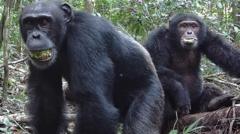Are Chimps Really Enjoying a Lager a Day with Their Fruit?

Published: 2025-09-17 18:05:17 | Category: technology
Recent research has revealed that wild chimpanzees consume significant amounts of alcohol daily through ripened fruit, suggesting that human attraction to alcohol may trace back to common primate ancestors. This fascinating study indicates that these primates ingest the equivalent of a bottle of lager each day, potentially shaping our own preferences for alcoholic beverages.
Last updated: 10 October 2023 (BST)
Key Takeaways
- Wild chimpanzees consume around 14 grams of ethanol daily from fermented fruit.
- This consumption is equivalent to nearly two UK units, or one 330ml bottle of lager.
- The research supports the "drunken monkey" hypothesis regarding human alcohol consumption origins.
- Chimpanzees do not consume enough alcohol to become intoxicated.
- Chimpanzees are endangered, facing threats from habitat destruction.
Understanding Chimpanzee Alcohol Consumption
Chimpanzees, like many other animals, have been observed eating ripe fruit that has fallen to the ground. While they are known to consume a variety of fruits, this study provides the first clear evidence of the amount of alcohol they may be ingesting. Researchers measured the ethanol content in fruits commonly consumed by these primates in Côte d'Ivoire and Uganda, revealing that certain fruits, such as figs and plums, have surprisingly high alcohol concentrations.
The Science Behind the Study
The research team, led by Aleksey Maro from the University of California, Berkeley, found that the ripe fruits consumed by chimpanzees contained significant levels of ethanol. Based on the quantity of fruit typically eaten by these animals, they estimated that chimpanzees ingest approximately 14 grams of ethanol daily. This is roughly equivalent to the alcohol content found in a standard bottle of lager.
Implications for Human Alcohol Preferences
The findings lend support to the "drunken monkey" hypothesis, a theory that suggests the human proclivity for alcohol consumption may have originated from our primate ancestors. This concept was first proposed by Professor Robert Dudley, who is also a co-researcher in the current study. The idea posits that early humans, much like chimpanzees, may have relied on fermented fruits as a source of nutrition, which included both sugar and alcohol.
Chimpanzees and Their Social Bonds
According to Prof Catherine Hobaiter, a primatologist at the University of St Andrews, the relationship between chimpanzees and alcohol consumption may extend back approximately 30 million years. The act of consuming fermented fruit may not only provide nutritional benefits but could also facilitate social bonding among these primates. By gathering together to eat ripe fruit, chimpanzees might strengthen their social connections, similar to how humans often socialise over drinks.
Chimpanzees and Intoxication
It is essential to clarify that the chimpanzees involved in this study do not consume alcohol in quantities that lead to intoxication. Dr Kimberley Hockings, a primate researcher at the University of Exeter, noted that excessive alcohol consumption would not enhance the survival chances of the chimpanzees. Instead, their intake remains within a range that allows them to benefit from the sugars without suffering negative effects.
Conservation Status of Chimpanzees
Despite their fascinating dietary habits, chimpanzees are classified as endangered. The International Union for the Conservation of Nature (IUCN) highlights several threats to their populations, primarily habitat destruction due to agriculture, logging, and urban development. As forests are cleared for these purposes, the natural food sources for chimpanzees, including the fermented fruits they rely on, are rapidly diminishing.
What’s Next for Chimpanzee Research?
This study opens new avenues for understanding the evolutionary biology of primates and their dietary habits. Future research may focus on the implications of alcohol consumption in wild populations, as well as potential effects on social structures and behaviours. Understanding how these behaviours evolved can provide insight into our own relationship with alcohol and its role in social interactions.
Conclusion: Reflecting on Our Shared Heritage
The connection between humans and alcohol may run deeper than previously thought, rooted in our evolutionary past with chimpanzees. This study not only sheds light on the dietary preferences of these primates but also raises important questions about how early human ancestors might have interacted with their environment. As we continue to explore the complexities of primate behaviour, we gain a better understanding of our own species and the shared history we have with our closest relatives.
FAQs
How much alcohol do wild chimpanzees consume?
Wild chimpanzees consume approximately 14 grams of ethanol daily from fermented fruits, equivalent to nearly two UK units or one 330ml bottle of lager.
What is the "drunken monkey" hypothesis?
The "drunken monkey" hypothesis suggests that human attraction to alcohol originated from our primate ancestors, who relied on fermented fruits as a food source.
Are chimpanzees becoming intoxicated from alcohol consumption?
No, chimpanzees do not consume enough alcohol to become intoxicated. Their intake remains within a range that does not adversely affect their survival or health.
What are the threats to chimpanzee populations?
Chimpanzees are endangered, facing threats from habitat destruction due to agriculture, logging, and urbanisation, which are rapidly diminishing their natural food sources.
Why is understanding chimpanzee behaviour important?
Studying chimpanzee behaviour helps us understand the evolutionary roots of human behaviour, including our relationship with alcohol and social bonding.



